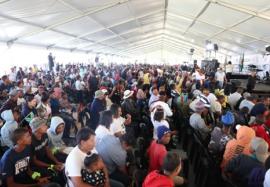Western Cape residents reflect on Reconciliation Day
Monday, December 16, 2024
As the country commemorates National Reconciliation Day, residents of Western Cape have reflected on how far the country has come since the advent of democracy.

“We come from a painful past where we were oppressed and treated like outcasts, but now we have democracy. We must forgive all those who were our oppressors,” Ntsika Madela from Vredendal told SAnews.
Madela’s comments come as President Cyril Ramaphosa delivered the keynote address at the 2024 National Day of Reconciliation commemoration held at the Vredendal North Sports Ground in the Western Cape’s Matzikama Local Municipality on Monday.
The theme for the 2024 National Day of Reconciliation is: "Healing Historical Wounds and Forging New Futures".
Observed annually on 16 December, the National Day of Reconciliation was established in 1995 after the end of apartheid. The public holiday aims to promote national unity and bridge historical divides.
To Western Cape communities, the celebration of the National Day of Reconciliation in their province was a special occasion.
Susan Marthys from Bonthevel, told SAnews that many had suffered at the hands of apartheid.
“During the apartheid government, we suffered a lot at the hands of the oppressors, some of our people could not live to enjoy the democracy we are enjoying today,” Marthys said.
Marthys said it was time for South Africans to preach peace and forget about the painful past.
In his address to the nation President Ramaphosa said that while the past may be behind us, the country is left with its wounds.
“We cannot heal these historical wounds by forgetting our past. There are things that should be done to heal the wounds of the past. But we must also learn from our past.
We have come a long way as a country of diverse cultures, languages, beliefs and traditions,” said the President.
He spoke of Vredendal as a beautiful and diverse community that is an integral part of our rainbow nation.
“Here, a person can be as proud of their coloured heritage or their Afrikaans language as they are of their South African identity.
"They can be white or African or Indian, speak English or Xhosa or any other language, while being a full and equal member of the South African nation.
“The apartheid regime tried to divide us and turn us against one another, but they did not succeed. Through democracy we have worked to restore the dignity of all who suffered under apartheid, including coloured people,” said the President. -SAnews.gov.za























































